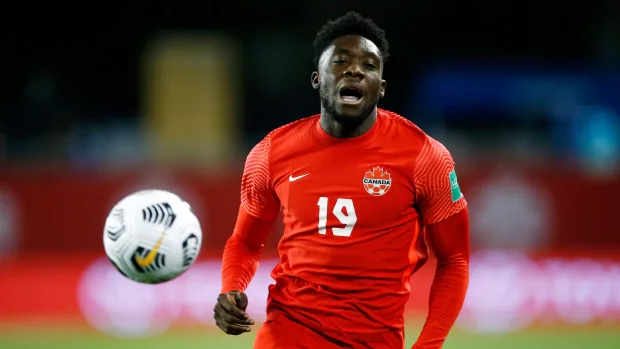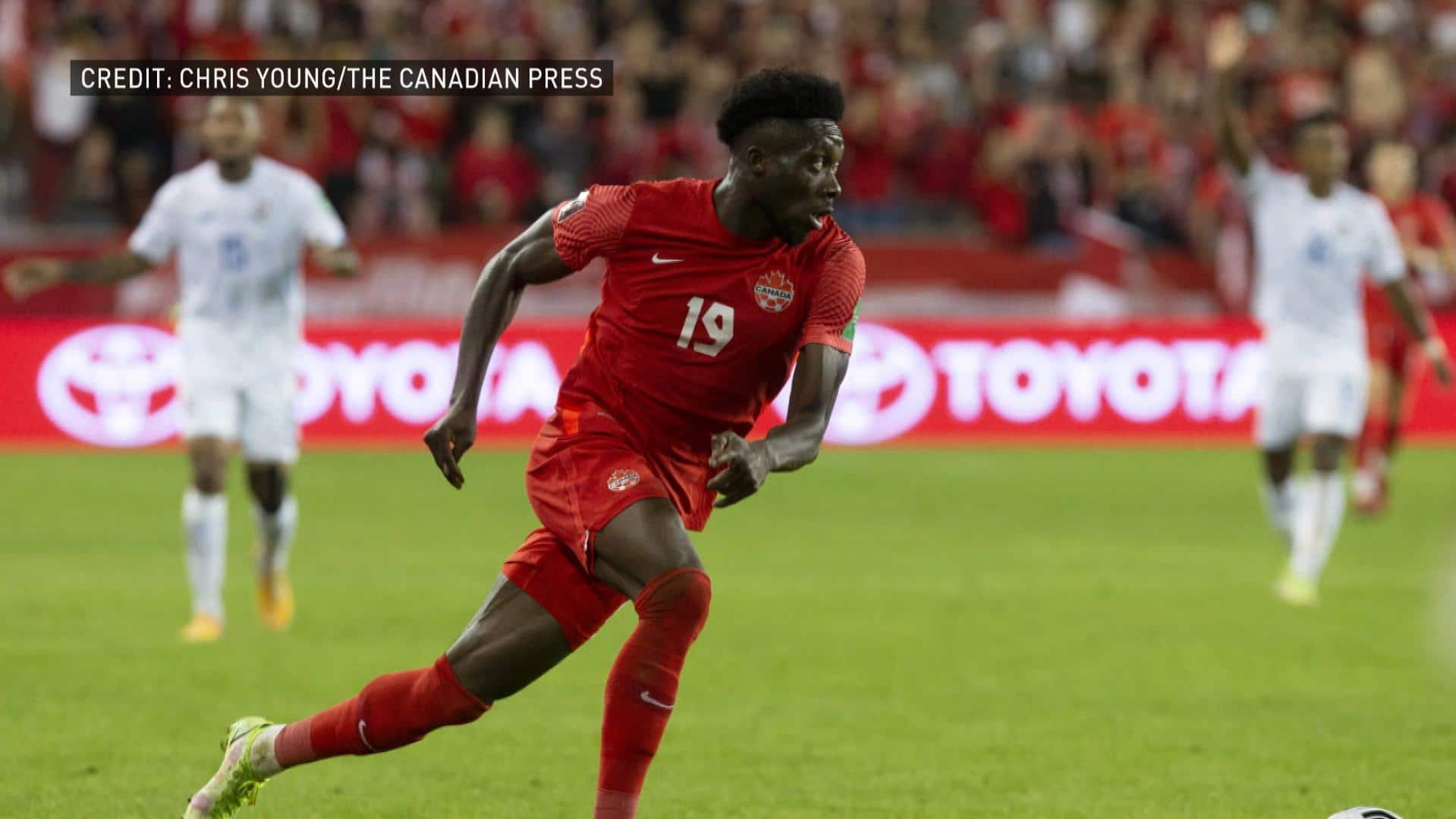
Canada’s upcoming trio of crucial World Cup qualifiers just became a lot more interesting, as star player Alphonso Davies has been ruled out due to a heart condition.
After originally testing positive for COVID-19 earlier this month, Davies had to isolate before returning to training with his pro club Bayern Munich this week. On Friday, Bayern manager Julian Nagelsmann revealed that Davies was diagnosed with mild myocarditis, an inflammation of the heart muscle.
While it is not expected to be a danger to Davies’ long-term health, Nagelsmann confirmed that the Canadian would immediately stop training with the team until further notice so he can recover. Canada Soccer also confirmed that Davies, a 21-year-old from Edmonton, won’t be available to play for the men’s team in its World Cup qualifying games.
Montreal-based cardiologist Dr. Christopher Labos told CBC News Network that the long-term prognosis for someone suffering from mild myocarditis is very good. He also described the usual treatment as bed rest and anti-inflammatories, and explained that you have to let the symptoms completely resolve before returning to physical activity.
“To get back to that peak conditioning [level], it may take a while for him to get back to what he was before,” Labos offered.
WATCH | John Molinaro discusses Canada’s outlook with Davies sidelined:
Alphonso Davies has been taken out of rotation by his club, Bayern Munich, for a mild COVID-related instance of myocarditis, an inflammation of the heart muscle. TFC Republic’s John Molinaro breaks down what this mean’s for Canada’s January World Cup qualifier matches. 3:08
Of course, Davies’ health is what matters the most. Still, there’s no denying that the timing isn’t ideal for the Canadian men’s team.
Canada currently tops the table in the final round of the CONCACAF qualifiers with a 4-0-4 record, and enjoy a two-point advantage over fourth-place Panama with six games remaining.
The top three nations in the eight-team group automatically qualify for the 2022 World Cup in Qatar, which means Canada’s road matches vs. Honduras (Jan. 27) and El Salvador (Feb. 2), and its game against the U.S. in Hamilton (Jan. 30) could go a long way in determining its fate.
Make no mistake about it: the loss of Davies is a big blow, as it robs Canada of a player of such sublime skill with speed to burn. Davies debuted for Canada as a 16-year-old in 2017.
Since then, the left fullback has firmly established himself not only as Canada’s brightest star (with 10 goals and 15 assists in 35 games), but as one of the premier players in his position in the sport.
WATCH | Davies to miss trio of World Cup qualifiers:
Canadian soccer superstar Alphonso Davies will miss his next three FIFA World Cup qualifying matches after being diagnosed with myocarditis, a heart muscle condition linked to COVID-19. Davies, who is fully vaccinated, tested positive for COVID-19 in early January. 1:58
The co-winner of the 2020 Lou Marsh Trophy, Davies has become a global superstar ever since his transfer from the Vancouver Whitecaps of Major League Soccer to Bayern Munich, German champion and one of the most famous clubs in world soccer.
Davies’ speed and trickery on the ball and attacking flair makes him a nightmare to deal with for opposing defenders. His five goals in the current qualifying campaign is one of the reasons why Canada appears poised to qualify for the World Cup for only the second time in its history, having previously competed in 1986 in Mexico.
Vastly improved national depth
Still, this is not a one-man team. Like Davies, Jonathan David (Lille OSC), Cyle Larin and Atiba Hutchinson (Besiktas), and Tajon Buchanan (Club Brugge) feature for European clubs.
Canada is also brimming with top MLS stars — most notably Jonathan Osorio of Toronto FC and the Colorado Rapids’ Mark-Anthony Kaye.
Never has Canada boasted a team loaded with such depth and genuine quality at every position, giving coach John Herdman plenty of options to choose from, even with Davies ruled out.
WATCH | Health expert says Davies’ recovery likely to take ‘several weeks’:
Although the prognosis for his recovery looks good, it will likely take ‘several weeks’ for Canadian soccer star Alphonso Davies to get back to peak condition after being diagnosed with myocarditis, says cardiologist Dr. Christopher Labos. 5:48
Former Canadian midfielder Terry Dunfield, who played 14 times for Canada from 2010-2015, believes the men’s team has the manpower to successfully come through this slate of important World Cup qualifiers without Davies.
“If you asked me this five years ago when [Davies] made his debut, I’d probably say Canada is f—ked.” Dunfield told CBC Sports
“Five years later and it’s such a great thing to be able to say, with all due respect to Davies, his potential absence isn’t nearly as detrimental. Canada loses a little bit of presence without him, for sure. But I really think Canada can get by this international window without him.”
Familiarity without Davies
There is recent evidence to back up that bold claim.
Canada looked very strong at last summer’s CONCACAF Gold Cup without Davies due to a torn ligament in his ankle, advancing to the semifinals of the biennial competition for the first time since 2007.
Davies picked up a knee injury in Canada’s 1-1 road draw against the United States last September. Three days later against El Slavador, Canada rolled to a 3-0 win in Toronto while Davies was back in Germany recuperating.
With three matches in three different countries over a seven-day period, chances are that Herdman was always going to heavily rotate his squad and rely on his depth, and that Davies could have been rested.
“Canada’s DNA is built around being tactically adaptable, and this incredible brotherhood the players have formed. … There’s enough quality in the squad and enough togetherness that the players can help each other through this,’ Dunfield offered.
“Tactically, how Canada will play depends on the opponent. It was always going to be a little bit different for each game, regardless if Davies was there or not. So, the quick turnover and the travel are, for me, the big complexities surrounding these games.”

